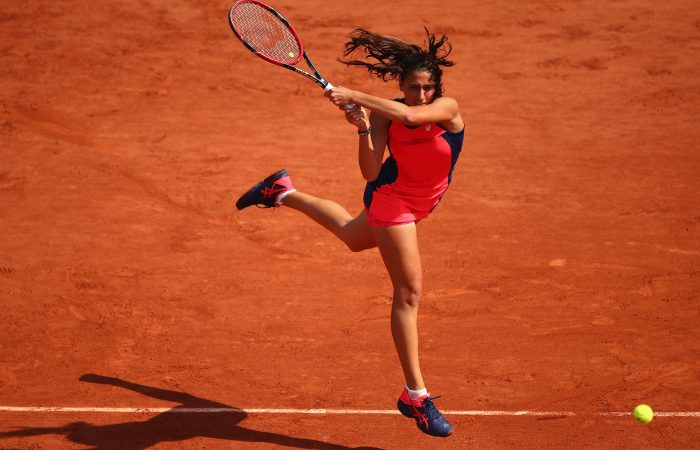Five minutes with … Jaimee Fourlis
Back in action after a three-month break, Australian young gun Jaimee Fourlis is continuing her climb up the rankings - all the while completing Year 12.
Melbourne VIC, Australia, 6 October 2017 | Matt Trollope

Jaimee Fourlis is back on the court after a significant chunk of time away.
The reason she was out? The young Victorian, after a long stint on the road in Europe, had to focus on her studies.
The 18-year-old is completing Year 12 while her professional tennis career blossoms, with the highlights of 2017 so far being winning a round at the Australian Open and pushing Caroline Wozniacki all the way at Roland Garros.
We caught up with Fourlis while she was in Melbourne, between her recent appearance on the Pro Tour – where she reached quarterfinals in Penrith and Brisbane – and as her end-of-year exams loom.
After you played at Roland Garros, you didn’t compete for three months. What did you do in that time away?
“Being away for so long in Europe and playing a lot of tennis, I thought it would be a good idea to come home, do a really long training block and try to focus on a bit of school. It was a shame that I had to come home but sometimes you’ve got to do a couple of things (like that) and this will kind of prepare me for the future. I’ve got so many years ahead of me to play tennis and keep that momentum going.”
How are you finding the challenge of combining your education with a pro tennis career?
“It honestly has been difficult trying to play and do school at the same time. Also doing it online (is tough). You get all the support from Natalie Martin, the school supervisor here (at Tennis Australia), she does an amazing job with keeping us up to date, but it does get quite tough when you’re on the road and playing consecutive matches. You kind of do forget to do school, or some days you’re pretty tired and you get home late and the last thing you think about is trying to do school … it does get a bit difficult but at the same time this is my final year, and I haven’t done 13 years of school for nothing.”
Some players don’t finish their schooling. You’ve made the decision to keep going. Why have you chosen to do it this way?
“I think it’s always good to have school (on your CV). Of course tennis is my No.1 priority when I do finish school. And who knows where tennis will take me? If I end up not doing (more study), then great (laughter). I’ve kind of tried my best with school and then once I do finish it then it will be all on tennis and see where that takes me.”
Were you worried at all that it would be hard to come back to competition after such a long time away?
“It’s pretty tough when you’re either injured or training so long and you’re not exactly competing every day. It does get quite tough and you kind of lose that momentum. But I did go to America just before I played these (Pro Tour) tournaments and played a junior tournament over there in singles and doubles (editor’s note: she won both) so that was really good to try and get a couple of matches under my belt. At times it can be tough (to return) and that self belief goes through the window a little bit. For a couple of weeks all we did was play practice sets back to back, trying to play three sets, trying to increase my load. So we played a lot of practice sets and points throughout the weeks of training just to keep that match fitness going.”
Let’s go back to the match against Wozniacki in the first round at Roland Garros. She went on to make the quarterfinals, but you pushed her to three sets and really gave her a scare. How was that experience?
“I played really well at the French Open and leading up to it. Definitely got a lot of feedback and a lot of confidence from that match. Got a lot of praise as well and thanks to everybody for sending their messages – I really do appreciate it. The support was overwhelming and it was a match I’ll never forget. And it’s a level I know I can play, I just have to build up to it and sustain it.”
Caroline must’ve given you a good idea of the level you have to attain – and sustain. What did you learn from that match, and what will you work on as a result?
“Still working on a couple of things, like my movement. She’s a great athlete, she’s been No.1 in the world, she’s been there for a reason. I think just being able to back each point up consistently and play some really solid tennis when it counts. She was very consistent when she needed to be and she was aggressive when she needed to be. She just knew when to use her strengths. So I think that’s whats I can improve and what I can take away from that match.”
Now that you’ve turned 18 and you can play a full schedule, how will it look for the rest of the year, and in 2018?
“We do have the December Showdown coming up. Hope I’ll play the 18s (Australian Championships) where there’s a wildcard up for offer at the Australian Open again. And just travel more next year. I won’t have school, which is a great thing. And if I can improve my ranking (currently No.325) I’ll try and play some WTA events and play some harder tournaments and just learn from the girls around me, and from all the pros.”